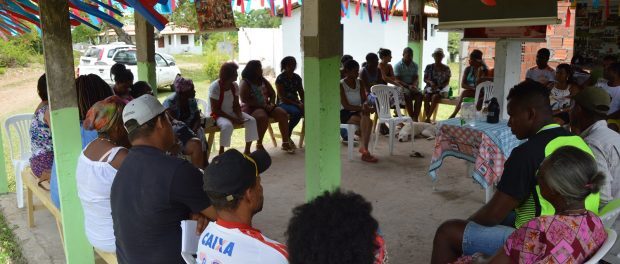
The Quilombo Council of the Iguape Basin and Valley, from the Cachoeira region of Brazil’s northeastern state of Bahia, held its first meeting on January 28 in Quilombo do Dendê, located in the All Saints Bay region. The council acts directly and indirectly with more than 3,500 families, as it is composed of fourteen quilombo (Brazilian Maroon) communities dispersed across the districts of Santiago do Iguape and São Francisco do Paraguaçu. The participating quilombos are: Kaonge, Kalembá, Kaimbongo, Velho, Kalole, Dendê, Imbiara, Engenho da Ponte, Engenho da Praia, Engenho da Vitória, Tombo, Engenho Novo, Engenho da Cruz, and Brejo.
The Quilombo Council is a network organized by these quilombo communities to dialogue, exchange experiences, and organize themselves to persuade authorities to address their demands. The Council aims to bring together all quilombo communities in the region in order to mobilize other communities around the struggle, land regularization, access to public policies, and collaboration with other movements. During the first Bahian Meeting of Quilombo Communities, the Council participated in the creation of The Quilombolan Committee of Bahia in Action, the Iguape Bay Extractive Reserve Committee, and the Bay Territory Management Nucleus, among others.
The communities which comprise the Council have gone through a variety of organizational processes—some developed sporadic organizing practices while others are more consolidated having developed around certain causes and associations.
During the first meeting of the year, several important topics were the subject of discussion. In addition to the Council’s members, representatives from the National Institute of Historic and Artistic Heritage (IPHAN), the School of Biology at the Federal University of Bahia (UFBA), Connecting Territories, the Awuré Institute, and various local associations were also present.
Ananias Vania, a member of the quilombo community Kaonge, introduced the topic of agroecology for healthy food, including better production practices for high quality fare that avoid slash-and-burn deforestation or using agro-toxics. Also discussed were the organization and certification of family farmers, as well as recognition and appreciation for the history and cultivation of dendê palm oil.
The Council also discussed the growth of community tourism. On this issue, the communities have organized themselves through the Freedom Path Ethnic Tourism Nucleus.
Representatives of the Kaonge community spoke about the sixth edition of the Ancestral Walk, which had taken place the day before with the participation of partners, students of the UFBA School of Biology, tourists, and a state secretary. The walk takes more than four hours, representing the journey made by the community’s matriarch, who leaves at 4am, sells her goods, and returns the same day. For decades, she has taken this journey to sell her products in Acupe, a Bahian community of indigenous and African roots.
Another item of discussion was the participation of quilombo communities in the World Social Forum that will take place in Salvador between March 13 and 17. Questions were raised regarding the difficulty of finding lodging for the quilombo communities. Milena Nascimento, from the Awuré Institute and an organizer of the World Social Forum, emphasized the importance of quilombo communities being present and having their own voice so that “traditional communities can resist and no longer be kept invisible.”
The participating quilombos also presented a letter demanding the certification of the Iguape Valley communities by IPHAN and the Bahian Institute of Artistic Heritage and Culture (IPAC).
Other topics at the meeting included a conflict mediation training that will be held in July by the University of Virginia, a project funded by the European Union, and a presentation of a project proposed by UFBA’s School of Biology.
Especially important were the issues of interventions related to the land regularization of their territories. At the end of the meeting, representatives of each community organized themselves into a working group in order to address the subject.
By forming the Council, the quilombo communities of Iguape Basin and Valley are fighting collectively for the realization of their rights and for the power to speak for themselves.
Thaís Rosa Pinheiro has a Masters degree in Social Memory from UNIRIO and is the founder of the community-based tourism agency Conectando Territórios.


